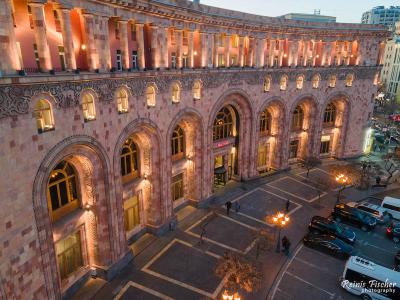Armenia and Israel are two countries that share some similarities, as well as some differences. Both countries have unique cultural and historical backgrounds, and their geopolitical situations have shaped their respective national identities.
In this article, we will explore some of the similarities and differences between Armenia and Israel.
Similarities:
-
Diaspora communities: Both Armenia and Israel have strong diaspora communities around the world. In Armenia's case, this is primarily due to the Armenian Genocide of 1915, which forced many Armenians to flee their homeland. Similarly, Israel's Jewish diaspora is a result of centuries of persecution and discrimination that culminated in the Holocaust.
-
Religious heritage: Both Armenia and Israel have a strong connection to religion. Armenia was the first nation to adopt Christianity as its official religion in 301 AD, and it remains a deeply Christian country to this day. Israel is the birthplace of Judaism, Christianity, and Islam, and it is home to some of the world's most sacred religious sites.
-
Regional conflicts: Both Armenia and Israel are situated in regions that have experienced ongoing conflicts and political tensions. In Armenia's case, this is primarily due to its longstanding territorial dispute with Azerbaijan over the Nagorno-Karabakh region. Israel has also experienced a significant amount of conflict with its neighbors, including the ongoing Israeli-Palestinian conflict.
Differences:
-
Geographical location: Armenia is a landlocked country situated in the Caucasus region of Eurasia, while Israel is located in the Middle East, bordering the Mediterranean Sea to the west and the Jordan River to the east.
-
Political systems: Armenia is a parliamentary republic, while Israel is a parliamentary democracy. Armenia has a president who serves as the head of state, while Israel has a president who serves as a largely ceremonial figurehead, with most of the political power held by the prime minister.
-
Language and culture: Armenia has its own distinct language and culture, with a rich history of literature, music, and art. Israel is home to a diverse mix of cultures and languages, with Hebrew as the official language and Arabic as a recognized minority language.
-
Conflict resolution: Armenia and Israel have taken different approaches to resolving conflicts with their neighbors. Armenia has been involved in ongoing negotiations with Azerbaijan to resolve the Nagorno-Karabakh conflict, while Israel has taken a more hardline approach to its conflict with the Palestinians, including the construction of settlements in the West Bank.
In conclusion, while Armenia and Israel share some similarities, they also have many differences that make each country unique. Their respective histories, political systems, and cultural traditions have shaped their national identities and their approaches to conflict resolution. However, both countries share a deep connection to religion and strong diaspora communities around the world.





